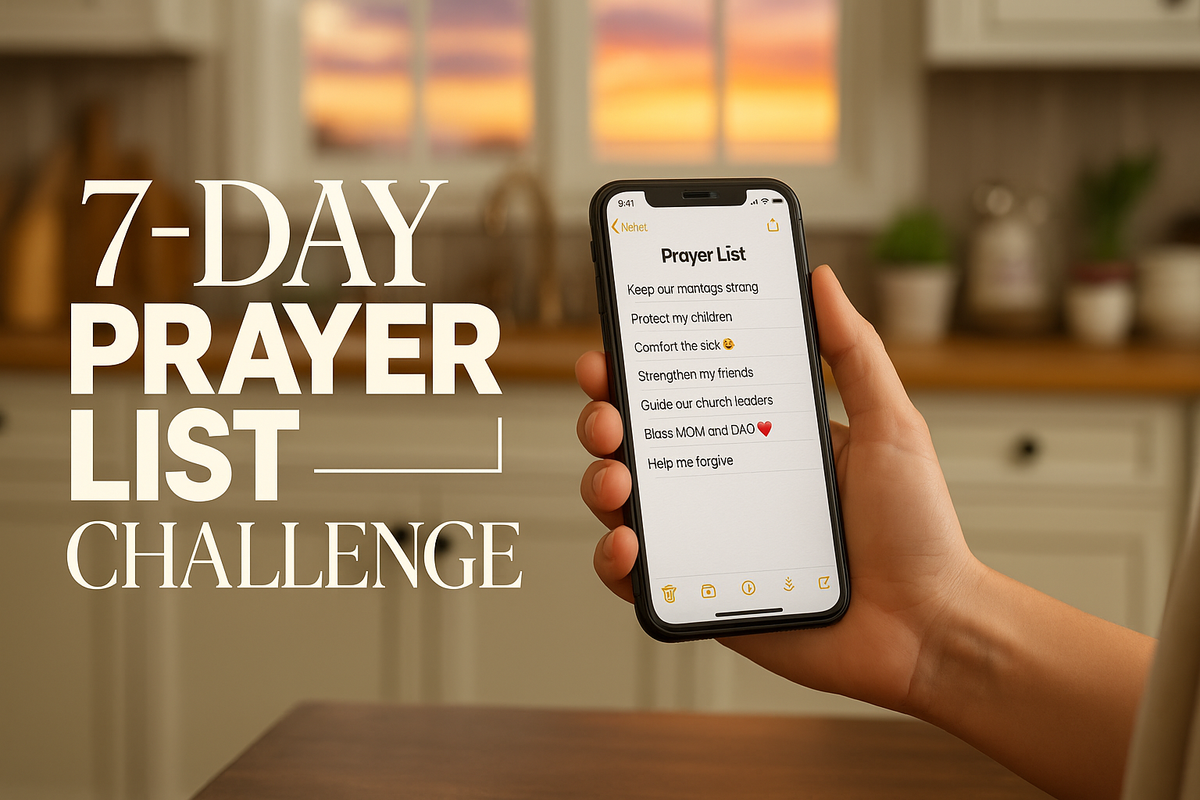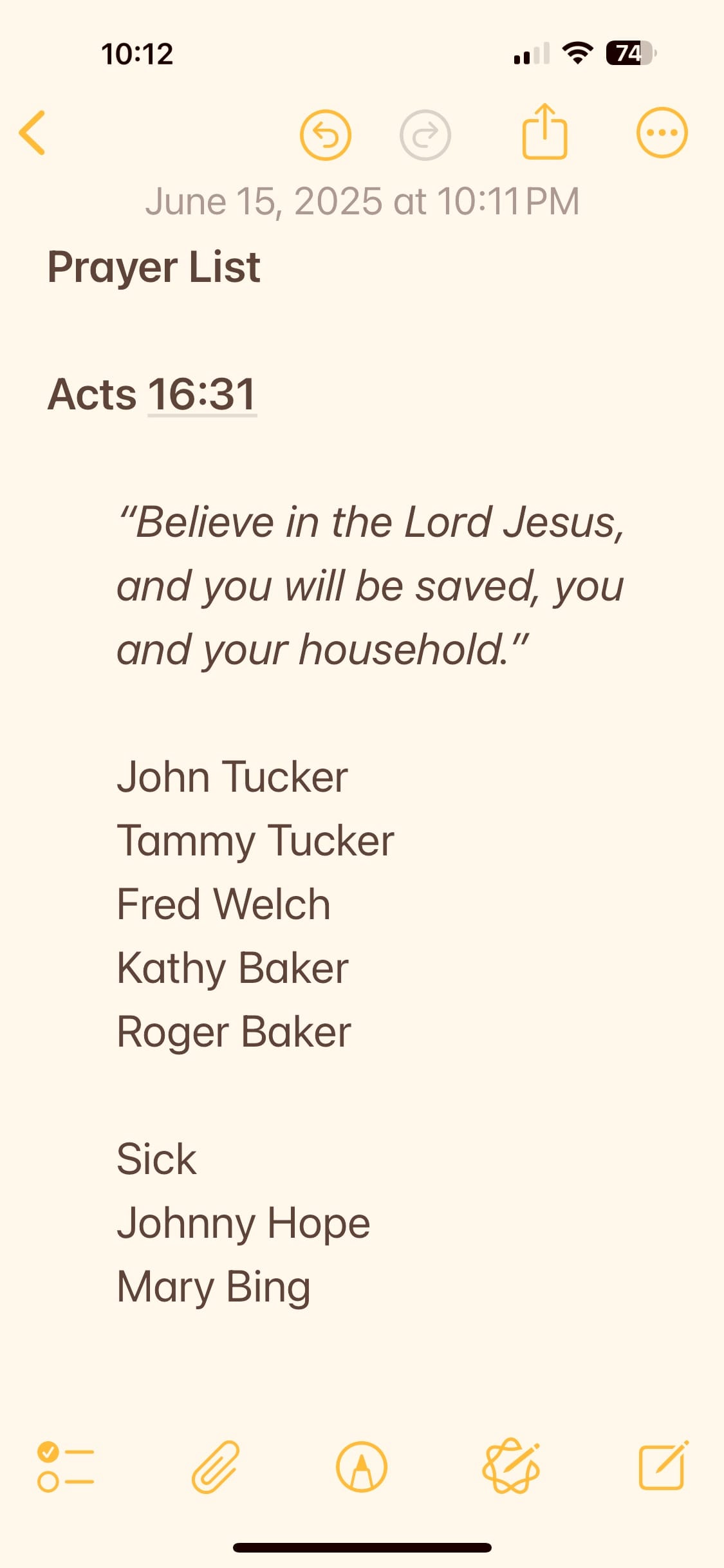Lift Others Up: Your 7-Day Prayer List Challenge

A Personal Starting Point
I’ve never been great at keeping prayer lists. I either forget them, lose them, or overcomplicate the system. But this year, something shifted—I felt prompted to try again, simply. What I found surprised me: not only did my prayers deepen, but so did my awareness of others, and my sense of God’s work in their lives.
Writing prayers down isn’t a requirement, but it’s a powerful invitation. It helps you carry people before the Lord, and it gives you a record of His faithfulness over time.
I also use my prayer list to offer prayer for others—both believers and nonbelievers. It’s a gift I can give: lifting someone’s burdens before the Creator of the universe. Sometimes I tell them I’m praying for them. Other times, it’s quiet and hidden. Either way, it matters. This gesture is often received positively from nonbelievers and can open the door to discuss spiritual issues. Asking someone, "Is there anything I can pray for?" is one of the gentlest, most powerful invitations to spiritual conversation.
What Is a Prayer List?
A prayer list is a humble tool—not a formula—that helps you lift others to God. It is:
- A sacred habit, not a ritual
- A quiet expression of love through intercession
- A way to partner with Jesus, our High Priest (Hebrews 4:14–16)
In Orthodox monasteries, monks keep prayer lists to intercede for the world—a practice that echoes Paul’s letters and our call to pray without ceasing.
Why Keep One?
- We forget people. God doesn’t—but we do.
- It trains your heart to care more deeply
- It helps you become a quiet intercessor before the throne
- It turns into a journal of answered prayers
- It reflects the ancient rhythm of remembering others in love
- It builds bridges to the lost and the struggling
- It softens your heart and stretches your love
- It helps you stand in the gap, lifting others to Jesus
You might wonder if a prayer list feels too structured—even too "religious." But it’s not about performance. It’s about returning again and again to the Father, trusting Him to work in others' lives.
Biblical Roots
- 1 Samuel 12:23 – “Far be it from me that I should sin against the Lord by failing to pray for you.”
- Romans 1:9 – “I mention you always in my prayers.”
- Colossians 1:9 – “We have not ceased to pray for you.”
- 1 Timothy 2:1 – "I urge that supplications, prayers, intercessions, and thanksgivings be made for all people."
What Happens When You Practice It?
- You begin to see the hand of God moving—sometimes quietly, sometimes unmistakably.
- You shift from self-focus to intercession, praying beyond your own world.
- You recognize divine nudges: a name, a memory, a moment that won’t leave you alone.
- You build a hidden testimony—quiet evidence of God’s faithfulness in the lives you’ve carried.
- Your compassion stretches; your heart grows softer toward others.
- Gratitude begins to overflow, even in small things.
- You witness real answers—some subtle, some so spectacular they leave you in awe.
What It Can Look Like
- A notebook page with names sorted by category: family, friends, church, work, global
- Rotating days: e.g., Monday = family, Tuesday = coworkers
- A short, focused list with just 3–5 people
- A whiteboard or sticky notes by your desk or kitchen
- A journal with one page per name, recording your prayers over time
- A prayer app like Echo for reminders and encouragement
- I use Notes on my iPhone - example below

Tips to Keep It Simple
- Don’t overload it. Pray what you can.
- Let names come and go—faithfulness matters more than perfection
- Ask the Holy Spirit to guide your list
- Don’t wait for a crisis to start one
- Even a weekly glance at your list can shape your habits
- Share your prayer list habit with a friend or small group
- Choose a physical spot: near your coffee, bedside table, or desk
What If You Miss a Day?
- No guilt. Just come back.
- The goal is relationship, not ritual
- You’re not building a task list—you’re standing in the gap with love
7-Day Challenge: Try This for One Week
- Day 1: Write down 6 names that come to mind. Pray slowly over each.
- Day 2: Add someone from your past who still rests on your heart—an old friend, teacher, mentor, or even someone you lost touch with.
- Day 3: Write a short prayer beside each name.
- Day 4: Add a world leader or someone in authority.
- Day 5: Pray for someone you find difficult to love. Family, Friend or Work
- Day 6: Add someone who doesn’t yet know Christ.
- Day 7: Review your list and thank God for any signs of His work.
How to Start
- Choose your format (notebook, phone, card)
- Ask: “Lord, who needs prayer today?”
- Write what you know. Pray what you can.
- Don’t wait for the perfect system—just begin
- You’re not building a spreadsheet. You’re building a legacy of faithfulness
- God will honor your heart

The Persistent Widow: Why This Matters
Jesus told a story about a widow who kept coming—again and again—pleading with an unjust judge for justice. The judge didn’t fear God or respect people, but finally gave in simply because she refused to quit.
“Will not God bring about justice for His chosen ones, who cry out to Him day and night?” — Luke 18:7
God isn’t like that judge. He doesn’t need to be worn down—He listens because He loves.
But He honors faith that doesn’t give up.
A prayer list is not nagging. It’s a quiet declaration of faith that says:
I still believe You hear me.
I still believe You care.
I’m still here, Father.




